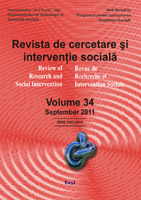Family Functioning in Maltreating Families: Implications for Parenting Programs
Family Functioning in Maltreating Families: Implications for Parenting Programs
Author(s): Iovu Mihai BogdanSubject(s): Social Sciences
Published by: Editura Lumen, Asociatia Lumen
Keywords: child maltreatment; family functioning; parenting programs; qualitative study.
Summary/Abstract: There is little research-based data on how child maltreating families experience their level of functioning and lack of data is even more stringent for Romanian space. Such knowledge generated primarily by qualitative methods is needed to deepen the different quantitative findings. Therefore, employing a qualitative design, the purpose of this study is to develop a preliminary theoretical model of functioning of child maltreating families. Child maltreatment was defined as physical, psychological or neglect caused by the one of the child’s parents. Family functioning referred to well-being or performance of the family unit in such domains as relationships within the family health/competence, conflict resolution,cohesion, leadership, and expressiveness. Data were collected using in-depth interviews with open-ended questions from children subject to maltreatment within the family (n=10). Transcribed interviews were analysed by using the McMaster Model of Family Functioning. Dysfunctional roles and lack of problem solving abilities within the family emerged as the core categories which described the phenomenon in general and was connected to all other categories of family functioning. The findings can be useful in developing future parenting programs for child maltreating families, in nursing education and in preventing child maltreatment.
Journal: Revista de Cercetare şi Intervenţie Socială
- Issue Year: 2011
- Issue No: 34
- Page Range: 127-143
- Page Count: 17
- Language: English
- Content File-PDF

